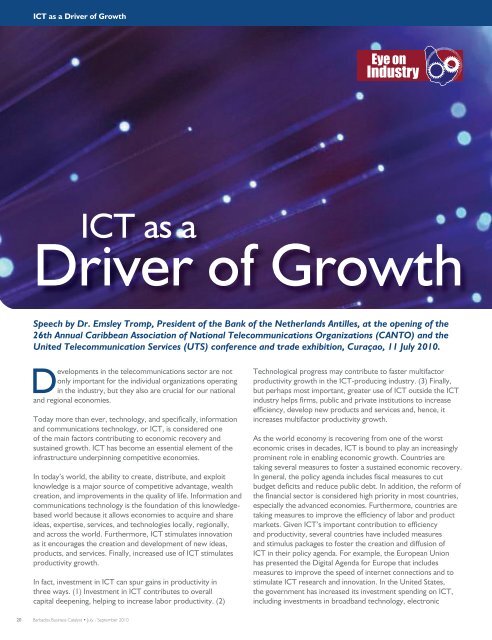BIDC Business Catalyst 6 #3.indd 1 12/21/10 3:17:07 PM
BIDC Business Catalyst 6 #3.indd 1 12/21/10 3:17:07 PM
BIDC Business Catalyst 6 #3.indd 1 12/21/10 3:17:07 PM
Create successful ePaper yourself
Turn your PDF publications into a flip-book with our unique Google optimized e-Paper software.
ICT as a Driver of Growth<br />
ICT as a<br />
Driver of Growth<br />
Speech by Dr. Emsley Tromp, President of the Bank of the Netherlands Antilles, at the opening of the<br />
26th Annual Caribbean Association of National Telecommunications Organizations (CANTO) and the<br />
United Telecommunication Services (UTS) conference and trade exhibition, Curaçao, 11 July 20<strong>10</strong>.<br />
Developments in the telecommunications sector are not<br />
only important for the individual organizations operating<br />
in the industry, but they also are crucial for our national<br />
and regional economies.<br />
Today more than ever, technology, and specifically, information<br />
and communications technology, or ICT, is considered one<br />
of the main factors contributing to economic recovery and<br />
sustained growth. ICT has become an essential element of the<br />
infrastructure underpinning competitive economies.<br />
In today’s world, the ability to create, distribute, and exploit<br />
knowledge is a major source of competitive advantage, wealth<br />
creation, and improvements in the quality of life. Information and<br />
communications technology is the foundation of this knowledgebased<br />
world because it allows economies to acquire and share<br />
ideas, expertise, services, and technologies locally, regionally,<br />
and across the world. Furthermore, ICT stimulates innovation<br />
as it encourages the creation and development of new ideas,<br />
products, and services. Finally, increased use of ICT stimulates<br />
productivity growth.<br />
In fact, investment in ICT can spur gains in productivity in<br />
three ways. (1) Investment in ICT contributes to overall<br />
capital deepening, helping to increase labor productivity. (2)<br />
Technological progress may contribute to faster multifactor<br />
productivity growth in the ICT-producing industry. (3) Finally,<br />
but perhaps most important, greater use of ICT outside the ICT<br />
industry helps firms, public and private institutions to increase<br />
efficiency, develop new products and services and, hence, it<br />
increases multifactor productivity growth.<br />
As the world economy is recovering from one of the worst<br />
economic crises in decades, ICT is bound to play an increasingly<br />
prominent role in enabling economic growth. Countries are<br />
taking several measures to foster a sustained economic recovery.<br />
In general, the policy agenda includes fiscal measures to cut<br />
budget deficits and reduce public debt. In addition, the reform of<br />
the financial sector is considered high priority in most countries,<br />
especially the advanced economies. Furthermore, countries are<br />
taking measures to improve the efficiency of labor and product<br />
markets. Given ICT’s important contribution to efficiency<br />
and productivity, several countries have included measures<br />
and stimulus packages to foster the creation and diffusion of<br />
ICT in their policy agenda. For example, the European Union<br />
has presented the Digital Agenda for Europe that includes<br />
measures to improve the speed of internet connections and to<br />
stimulate ICT research and innovation. In the United States,<br />
the government has increased its investment spending on ICT,<br />
including investments in broadband technology, electronic<br />
20 Barbados <strong>Business</strong> <strong>Catalyst</strong> • July - September 20<strong>10</strong>









